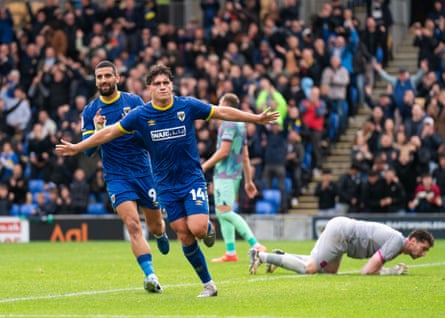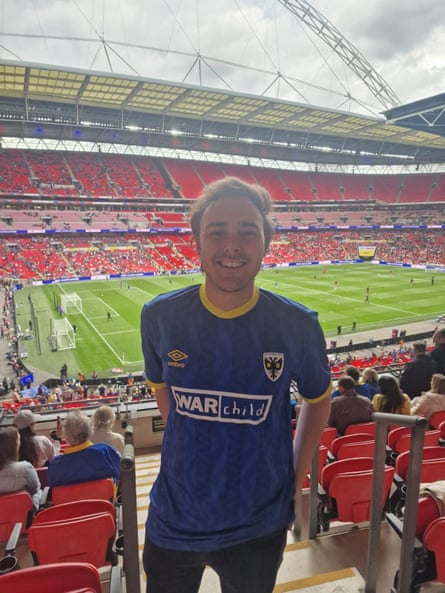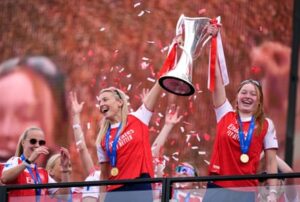Until about 10 years ago I despised football. That’s not to be confused with passive indifference – I held a genuine disdain for it. The way it smugly held cultural dominance and arrogantly took over every conversation repelled me. It had a history of stats and characters I wasn’t invited to learn about and, worse, it was littered with the ugliness of toxic masculinity and racism. It earned my loathing.
This all started in Cornwall. Though Truro City have recently won a historic promotion to the National League, in the Duchy in the 90s the opportunities to see national level football were sparse. My friends would make the two-hour journey up past the border to Plymouth Argyle to get a taste of that. It was relatively far and definitely not affordable for everyone.
Football therefore seemed to occupy a kind of paradoxical state where it felt at the same time all-encompassing and inaccessible.
Of all things, it was Fantasy Premier League that became my nerdy, mentally draining entry point to football. A cynical attempt to fit in? Sure, but it led me to follow my favourite team in the Premier League and, slowly, the game became demystified. I became an avid listener to the Guardian’s Football Weekly podcast. It fed my intrigue but I still didn’t feel I was enough of a real fan. Instead I was some kind of imposter. I had a rudimentary understanding of the game, its stars and its politics but that was about it.
It was only by the 2024-25 season, by which time I lived in south London, that I discovered AFC Wimbledon were a 20-minute walk from my flat. Intrigued, and never having investigated a local team of my own, I ventured to Plough Lane – home of the Wombles. I had no real knowledge of them beyond that they rang a distant bell as the club of John Green, an author and creator I followed in those early days of YouTube. He was the architect of a geeky community in which I comparably had no problem feeling at home.
The anxiety-inducing walk around the corner conjured fears of the local Dons smelling my imposter syndrome or somehow penalising me for the cultural appropriation of daring to sit in the home end. I’m not Louis Theroux, I can’t casually examine some weird subculture. Panic was bubbling.
With words of encouragement from my partner, we went to Wimbledon’s Carabao Cup fixture against Ipswich. They had recently been promoted to the Premier League, three divisions above Wimbledon. Sure enough, Ipswich took an early lead but Wimbledon recovered and forced the game to penalties. I didn’t think I’d feel a gut-wrenching sickness for a team I barely knew but I was wrong. During the shootout, an older gent strewn in club pins turned around from the row in front and said to my girlfriend: “This is going to give me a heart attack.” It didn’t and AFC Wimbledon won 4-2 on penalties.
after newsletter promotion
Relief. Celebration. And then … realisation? I found it remarkable at how present I’d been during the game. My mind didn’t wander into the familiar corners of worry or panic. The emotional ebb and flow of the game, the community and the characters – and the pies. Irresistible. This felt significant.
As the season went on I attended more matches. AFC Wimbledon’s subtle matchday seduction would begin with their £3 programme – a nostalgic relic from a bygone age but an invitation to learn. A reasonable price tag was also attached to tickets, food and drink. After games I would get sucked into club stories, check fixtures and shop the merchandise. I was amazed at the way the club enveloped the fans, who in this case owned them. There was little difference in supporting this club to the nerdy pursuits I had as a kid.
I felt as if I had a stake in AFC Wimbledon. I had found it, I had committed myself to keeping up to date with all of the latest news, I’d proudly wear the scarf in the local area. What have I become?
Curiosity became connection and I even invited some seasoned “football friends” to Plough Lane. I was insecure, I felt as if I was showing off a new home; but not my student digs – this was my flat, a place that meant something.
With a Glastonbury-esque effort, I secured a seat at the playoff final at Wembley and watched the Wombles win promotion to League One. On the stadium concourse it was dizzyingly exciting and I felt I could talk to anyone anxiety-free. Following this accessible football club had genuinely given what to me was a superpower.
It would be naive to think that there isn’t some heartbreak in store for me at some point. I know it’s a rite of passage and it will hurt, more than when my Premier League favourites lose or my Fantasy League team inevitably fail again next season. But for now I wholeheartedly credit the Wombles for giving me a confidence boost and a love of the game.
As the new season starts I’d encourage anyone football-curious to give their local team a chance to mean something to them. There is something kinder and more inclusive about football fandom out there.










